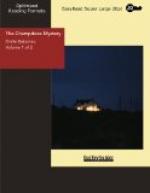leaned against the chill stone until he almost became
as cold as it was. It seemed to him at that moment
that life and hope were rapidly drifting away from
him. He had lost all count of how long he had
been on guard. He pulled out his watch, but it
was too dark to distinguish the hands or the figures
on the dial-plate. A neighboring clock struck
the half-hour, but this gave him no clue as to the
time. He had almost made up his mind to leave,
when he heard the sound of a quick step coming down
the street. It was the light, quick step of a
sportsman,—of a man more accustomed to the
woods and fields than the pavement and asphalt of
Paris. Then a shadow fell upon the opposite wall,
and almost immediately disappeared. Then Norbert
knew that the door had opened and closed, and that
the man had entered the garden. There could be
no doubt upon this point, and yet the Duke would have
given worlds to be able to disbelieve the evidence
of his senses. It might be a burglar, but burglars
seldom work alone; or it might be a visitor to one
of the servants, but all the servants were absent.
He again raised his eyes to the windows of his wife’s
room. All of a sudden the light grew brighter;
either the lamp had been turned up, or fresh candles
lighted. Yes, it was a candle, for he saw it borne
across the room in the direction of the great staircase,
and now he saw that the anonymous letter had spoken
the truth, and that he was on the brink of a discovery.
A lover had entered the garden, and the lighted candle
was a signal to him. Norbert shuddered; the blood
seemed to course through his veins like streams of
molten fire, and the misty atmosphere that surrounded
him appeared to stifle him. He ran across the
street, forced the lock, and rushed wildly into the
garden.
CHAPTER XVI.
Husband and lover.
The writer of the anonymous communication had only
known the secret too well, for the Duchess de Champdoce
was awaiting a visit that evening from George de Croisenois;
this was, however, the first time. Step by step
she had yielded, and at length had fallen into the
snare laid for her by the treacherous woman whom she
believed to be her truest friend. The evening
before this eventful night she had been alone in Madame
de Mussidan’s drawing-room with George de Croisenois.
She had been impressed by his ardent passion, and
had listened with pleasure to his loving entreaties.
“I yield,” said she. “Come
to-morrow night, at half-past ten, to the little door
in the garden wall; it will only be kept closed by
a stone being placed against it inside; push it, and
it will open; and when you have entered the garden,
acquaint me with your presence by clapping yours hands
gently once or twice.”
Diana had, from a secure hiding-place, overheard these
words, and feeling certain that the Duchess would
repent her rash promise, she kept close to her side
until George’s departure, to give her no chance
of retracting her promise. The next day she was
constantly with her victim, and made an excuse for
dining with her, so as not to quit her until the hour
for the meeting had almost arrived.




